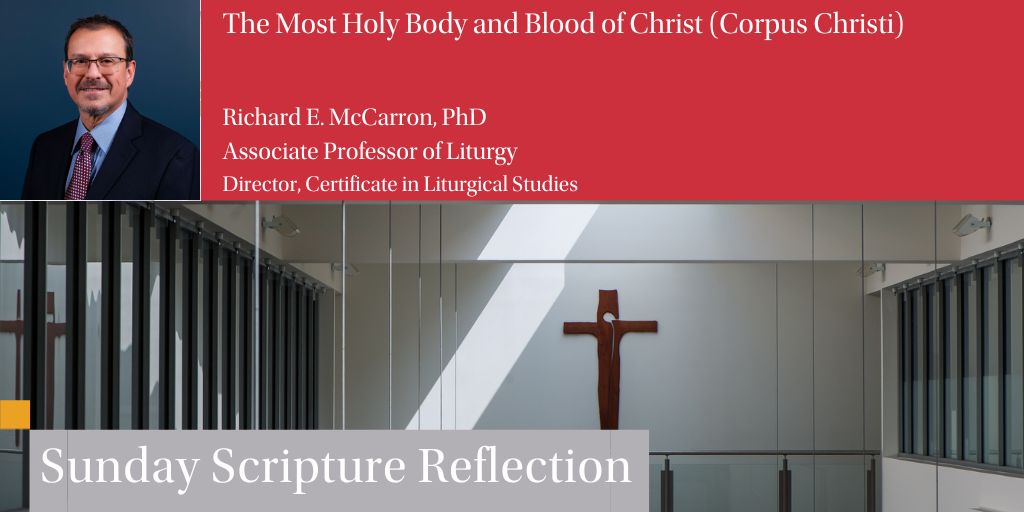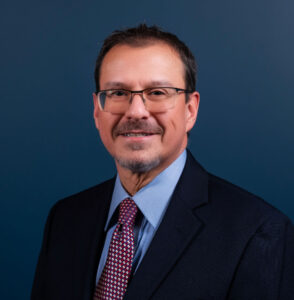

Readings:
Genesis 14:18-20
1 Corinthians 11:23-26
Luke 9:11b-17
Pentecost continues to reverberate as we move from the Easter Season into the time through the year. As we celebrated the Spirit transforming us and the world, empowering us for proclamation and mission, as we reflected on the way the Spirit draws us into the life of the Triune God, today we celebrate who we are as Church, a communion of love through the Eucharist, the gift of Christ’s self to us in the memorial of his death and resurrection.
We refer to this feast by a shorthand Latin phrase, Corpus Christi, the Body of Christ. Throughout our tradition, that phrase has been understood with a surplus of meaning. We speak of the Body of Christ, born of Mary, who suffered, died, rose, ascended, and will come again in glory. From Paul we speak of the Body of Christ, the church, we who are baptized, who make visible to the world God’s gracious love in Christ through the Spirit. And, as the sequence hymn for today’s liturgy signals, our “special theme for glad thanksgiving,” the Body of Christ, the gift of the eucharist, the sacramental presence of the risen and glorified Christ.
How to speak of such a wonderous gift? The liturgy today explodes with biblical allusions, theological themes, and ecclesial tropes with roots in the thirteenth century when the feast began at the inspiration of a woman mystic. These themes shape a sort of liturgical word cloud, with each word, phrase, or figure leading us more deeply into this extravagant gift. The gospel today speaks of the disciples collecting abundant fragments (klasmata) from the sharing of a meal. Perhaps this image can guide us through the Liturgy of the Word today.
Our first reading and the psalm summon up for us a fragment of the story of the mysterious figure of Melchizedek, the righteous king of peace and priest of God Most High. We hear of blessing, communion, and sharing of abundance. The early church would see in Melchizedek a glimpse of Jesus as a priestly king and the action of the church’s offering of bread and wine to celebrate the new covenant in Christ.
We get a fragment of Paul’s admonition to the church in Corinth, where he uses the memory of Jesus’s meal on the night before he died to reshape the broken practice of their celebrating a meal that disregards the poor and creates divisions. For this reason, he reminds them, when we gather, we remember and proclaim the death of the Lord in hope of his coming. Our meal is a sharing in the Body and Blood of Christ, a communion, that makes us one in Christ. As the scripture scholar Xavier Léon-Dufour explains, in the gift of his body and blood in the eucharist, Christ tells us who we are to become—his Body—and how we are to become that body, by being poured out in love for one another.
Some of us may sing or listen to the sequence for today, Lauda Sion. Composed by Thomas Aquinas, this hymn is like his Summa Theologica in song, presenting doctrinal themes in poetic verse to bolster our faith and devotion in the true presence of Christ, “whole and entire.”
While we may be dazzled by these many and various eucharistic doctrines, the gospel prompts us to reflect on the eucharistic mystery with a particular lens: Christ is abundant food for all. Once he is broken on the cross, he gives himself to all who seek to follow him, to all who hunger and thirst for the good news of the Reign of God and to share in divine life. We who have heard about the mercy and love of the Reign of God are called not to send folks away to fend for themselves but to welcome them to eat together. The disciples don’t dole out provisions but gather the crowd into groups to sit down as at a table, a true con-vivium, a living and eating together. In the action of sharing, breaking, fragmenting, five loaves and a few fish—Jesus and the twelve disciples’ meal—become a satisfying banquet of abundance with leftovers!
Their food desert becomes a new relational space with Jesus’s welcome and their meal together. We cannot help but think of the crowds that press in for just a loaf of bread in the media images of acute food insecurity coming from Ukraine or Gaza or the 63 million people in conflict-affected countries in Africa. We cannot help but think of the hungry poor and immigrants in our own “villages” or who work on this country’s farmlands so we can have food on our tables. Our solidarity and sharing in the eucharist should compel us to strive for a more just world. Our celebration should commit us to respond to all the forms of poverty in our world (Mane Nobiscum Domini, no. 28).
As a postscript, Corpus Christi’s celebration came to be associated not only with a special liturgy, but also with a procession of the eucharist outside of the church. We might note that the original eucharistic procession of Corpus Christi was the communion procession to “draw near and take the body of the Lord and drink his blood outpoured” (see Sancti, venite, Christi corpus sumite). In an echo of that procession in the liturgy, some parishes may have the custom of or are introducing a eucharistic procession to extend our festive celebration to the streets. Indeed, the 2025 National Eucharistic Pilgrimage will wind its way to Los Angeles to conclude the initiative known as the “National Eucharistic Revival.” Perhaps more acutely than ever as the streets of Los Angeles have been marked by processions of protest against injustice and abuse of power, we might be reminded that we, the pilgrim Body of Christ, nourished by our food for the journey, are called to witness to the reign of God and that our experience of Christ’s presence in our midst moves us to a hungry world.
Our celebration of the eucharist makes us confident that the Lord is with us, a pilgrim people called to offer testimony to the wonderous gift of love, a pilgrim people who heed the words of St John Chrysostom:
Do you want to honor Christ’s body? Then do not scorn him in his nakedness, nor honor him here in the church with silken garments while neglecting him outside where he is cold and naked. For he who said: This is my body, and made it so by his words, also said: You saw me hungry and did not feed me, and inasmuch as you did not do it for one of these, the least of my brothers, you did not do it for me. (On the Gospel of Matthew, Homily 50.4)
by Richard E. McCarron, PhD
Associate Professor of Liturgy
Director, Certificate in Liturgical Studies